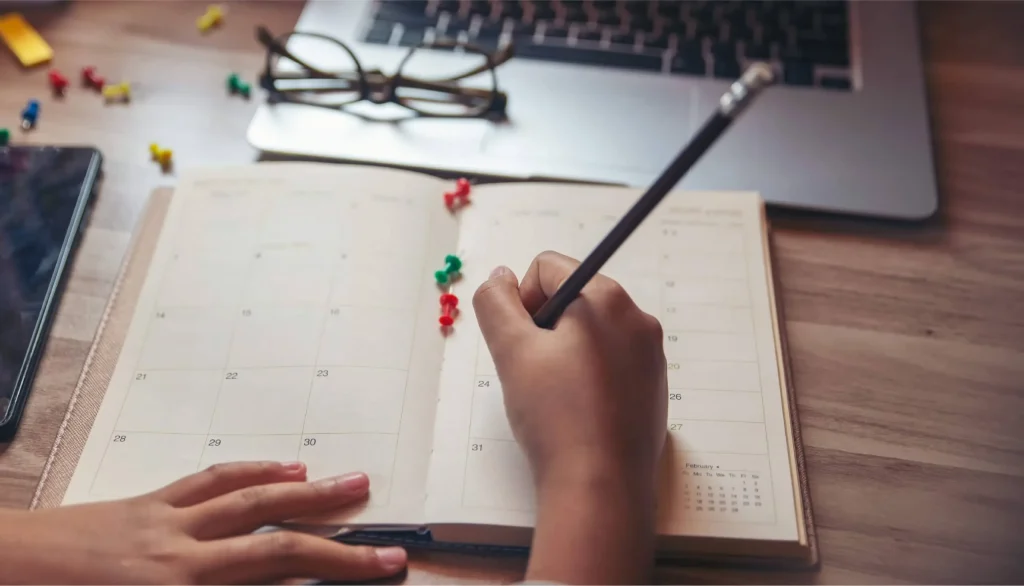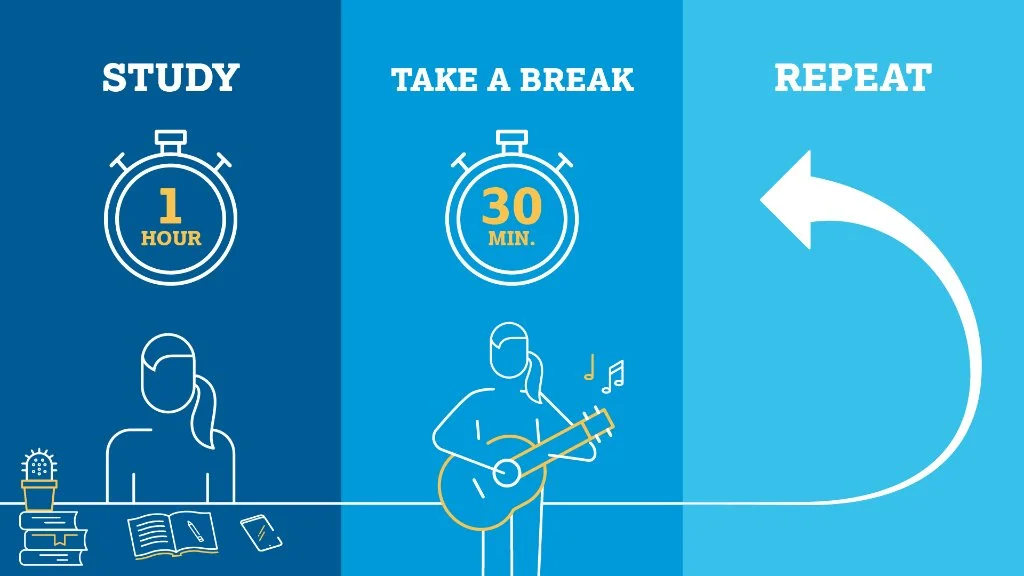This period is a crucial one for teen students as they develop effective ways of studying that form the basis of their academic success and lifelong learning. Studying poses difficulties for many young people because they are distracted by many things, do not know how to stick to a schedule or feel like they are not effective learners.
Understanding these problems and adopting practical measures can greatly assist them in coping with school workand develop teenage study habits .
Key Takeaways
- Effective Planning: Set down distinct aims and create a flexible schedule to manage your study time properly. This systematic way guards against cramming and distributes the workload equally over the week.
- Task Prioritization: You will have tools such as Eisenhower Matrix that will help you prioritize tasks in terms of their urgency or importance. Start with important ones so as to manage time better and avoid stress.
- Active Study Methods: Another approach would be implementing active learning techniques such as summarizing, testing oneself, and utilizing mind maps to improve comprehension and remembrance of information. Unlike passive strategies, these methods engage brain more efficiently.
- Regular Breaks: Include short energizing breaks in your study timetable for sustained productivity and avoidance of burnout. Non-screen activities are beneficial in refreshing one’s mind as well as body during break times.
- Rewards System: Use both small-short-term rewards as well as long-time ones to keep yourself motivated during studies. This type of positive reinforcement helps develop regular studying habits resultantly enriching overall learning experience as a whole
What is not Working?
Identifying the standard traps in teenage study habits is the initial stage to solve them efficiently. Most teenagers go through their studies without a clear plan, necessitating mismanagement of time and resources. This lack of planning usually gives rise to excessive workloads and missed deadlines.
Moreover, distractions such as mobile phones, social networks and other technologies are seemingly everywhere in this digital era thus causing massive loss of concentration and productivity. Furthermore, procrastination that is based on lack of motivation or the daunting look of tasks aggravates these challenges by creating anxiety and cramming at the last minute.
On top of these issues, poor time management plus inadequate studying methods make things worse because young ones find it hard juggling between numerous subjects whilst relying on passive study methods which do not improve memory retention and comprehension.

Why is Studying So Hard?
Many factors contribute to the problems teenagers have with their studying habits. One major problem is cognitive overload whereby many teens handle numerous subjects and assignments which can confound the brain making it hard to retain and process information.
Lack of interest in school work or its irrelevance is often a root cause of low motivation among students together with stressful or difficult tasks that lead to disengagement. In addition, external disturbances such as mobile phones, social media, among others distort the studying times hence decreasing efficiency conversely.
On top of that, an unfavorable study environment with noise, mess or discomfort makes focusing on academic work difficult. To solve this problem however, we must understand and lessen their impact on study productivity.

Tips for Improving Teenage Study Habits
These issues are multidimensional and therefore require multiple approaches for us to deal with them constructively. This article gives detailed strategies:
So how do we make studying more productive?
Enhancing study efficiency means using well-structured plans, task prioritization, active learning techniques and taking appropriate breaks at various intervals during studying periods. These skills will help teenagers better manage time and improve their grades.
Here’s how you can go about it:
- Set Clear Goals: Study sessions should be directed by goals that are specific and measurable; they ought to provide a sense of purpose too. For example, instead of an indistinct goal like “study history,” a more explicit one would be “finish world war two historical notes and then revise them.” Consequently, these make it easier for learners to concentrate better on their studies as well as keep track of their progress during such study sessions.
- Create a Study Schedule: A good structure will help students organize their time for studying, ensuring that all subjects are covered in the process. In your weekly planner or digital calendar, assign different times for various subjects and tasks. This way, cramming is avoided and the work load can be distributed over the week uniformly.
- Use a Planner or App: Assignments, exams and deadlines can be organized through calendars like Google Calender , Trello or Todoist among others . Once scheduled they serve as reminders which allow you to update dates at will . Digital tools offer flexibility with regards to keeping organized as well as following through with your studying timetable.
Successful studying also needs students to prioritize as well.
Prioritization of tasks ensures that the important and urgent ones are done first thus improving time management and reducing stress. The Eisenhower Matrix is a great tool for classifying duties into categories based on the two elements, urgency and importance, which allows one to know what should be done immediately and what can be postponed.
Making a list of three main activities every day helps in maintaining focus and direction thereby making it possible to approach those critical and time bound assignments from the beginning while at the same time preventing irrelevant tasks from stealing quality study time.
- Recognize What Is Urgent And Important: Use the Eisenhower matrix to assign each task according to its urgency and importance. It is better to concentrate on doing those duties which are both urgent and important other than scheduling them first before completing them.
- Set Daily Priorities: Prepare a list of the three principal tasks for each day at its start. This one assists in keeping track as well as initiating action in respect with priority level set earlier.

Short and frequent study sessions should be ensured.
Research has shown that short, regular sessions of study are more effective than long and irregular ones. For example, this approach can promote memory retention and comprehensive understanding by avoiding cognitive overload and keeping high levels of engagement.
The Pomodoro Technique, where 25 minutes is spent on studying followed by a 5-minute break, is particularly useful for maintaining focus and preventing burnout. When teenagers utilize this technique for their studies, they are better able to manage their time well as well as maintain consistency in what they do leading to improved academic performance besides reducing stress.
- Adopt the Pomodoro Technique: This method requires 25 minutes of studying followed by a five minute break thereafter at the end of which there’s need to take a longer one. With this kind of strategy, concentration is easily maintained while burnouts are avoided.
- Cheap Limitation: Seek to have daily shorter study sessions (20-30 minutes) instead of having longer infrequent ones thus decreasing last minute anxieties.
Time to take a study break
Your study efficiency could be affected by certain aspects of your body clock, such as your circadian rhythm. During peak alertness times studying can be more productive, with the sessions aligning best with periods when there is high concentration and energy levels in you.
It may be during early mornings or afternoon for many before scheduling for intensive studies at that time while fully alert. Alternatively, avoiding late afternoons or late nights when one’s energy levels are usually low will minimize frustration and hence improve the quality of your studies. By doing this we maximize the effectiveness of our learning efforts in line with our body clock.
- Identify Peak Times: Point out moments of high focus and alertness e.g. mornings or early afternoons for some people; thus tough tasks should be scheduled at these times to yield better outcomes.
- Avoid Low-Energy Periods: Do not assign difficult tasks during times when one usually feels sleepy like late afternoon or night due to fatigue but rather do lighter activities during these instances

Schedule reviving breaks
Breaks are usually needed to keep productivity and burnout at bay. It is important to insert short breaks in between your study sessions so that you can breathe and get back your focus, which will make you efficient. When on break, stretching, taking fluids or eating good food should be done to revive ourselves.
It is recommended that one avoids computers while doing away with eye strains and mental fatigue during the rest periods by choosing a physical or intellectual relaxation experience.
- Integrate Breaks: Integrate brakes into your learning sessions.Use these brakes to take a rest , stretch out oneself or have a healthy snack.
- Say No To Screens : Use a free time for other things except screen activities .This helps in reducing eye strain and mental fatigue
Prepare a schedule that has rewards
When you add rewards to your study program, it can provide encouragement and make studying more enjoyable. You can increase the morale of employees by setting up small, immediate rewards to be given out after sessions are over or goals achieved.
These may include things like watching a short video, eating your favorite snack or taking a short walk. In addition, big rewards are to be planned for major accomplishments such as semester completion or attaining certain grades; these rewards will help motivate employees in the long term.
This reward system helps maintain enthusiasm and encourages consistent study habits, making the overall experience more satisfying and effective.
- Small Rewards: Set aside some reward for yourself when you complete a session of studies or attain the set objectives. They could be minute joyrides like watching a brief flick or having treats.
- Big Rewards: Organize grander – scale awards at semester completion or getting particular grades; it could be something special in terms of a treat or an outing
How to use active study stratvegies
- Active study strategies are more effective than passive techniques in engaging the brain and can enhance retention and understanding. Summarization is the process of rewriting information using your own words, reinforcing the information and ensuring a deep understanding of main points.
- Self-testing helps to identify knowledge gaps by using flashcards or online quiz tools, as well as reinforcing learning through repetition. Teaching others takes such forms as explaining concepts to family members or friends you may be studying with, which serves to solidify your own understanding.
- Mind mapping is a visual tool that links ideas and concepts together; it organizes information and shows its relationship making difficult topics easier to understand and remember. In order to make these study sessions more interactive and productive implement these active approaches.
- Summary: After reading some material, summarize it in your words so that this will reinforce the information while you get the key points.
- Self-Tests: Make flashcards or use online quizzes on the subject matter to test your knowledge regarding it. This way one can also determine areas that would require further revision through regular self-tests.
- The teaching of others: talking to someone about something can help you understand it better; this could be a friend, family member or just in your imagination.
- Concept mapping: develop visual diagrams that connect ideas and concepts; mind maps assist with information organization as well as showing relationships between various topics.
Conclusion
By applying these strategies, teenagers can develop robust learning methods that improve academic performance in addition reducing stress and increasing overall efficiency of their studies.
If cultivated early enough, students can build the foundation of lifelong learning skills.
FAQs ABout teenage study habits
How can I help my teenager develop better study habits?
Encourage your teenage child to set visible and achievable goals and make a timetable that is highly structured for study. Engage in active learning methods as possible as well as ensure that the place allocated for study has no distractions. Likewise, breaks and incentive system can also be helpful.
What are some effective study strategies for teenagers?
Effective active learning methods such as summarization, self-testing, teach-backs and mind mapping. This way the brain is much more involved with the material which leads to improved retention and comprehension.
How can I reduce my teen’s study-related stress?
Aid your young person to list his or her obligations according to their importance, plan a feasible schedule of events and create time intervals between studies for relaxation purposes. Therefore, promote a balanced approach towards studying where there is enough time left out for enjoyment activities that will help in reducing tension.
Would you rather study in long sessions or break it up into shorter segments?
Shorter periods of concentrated studies tend to be more efficient than longer ones. Such practices as the Pomodoro technique with its 25-minute studying session followed by short breaks help maintain concentration and avoid burnout.
How can technology improve study habits?
Technology helps with studying through such things as online resources for interactive learning, flashcard apps, and digital planners. Apps for flashcards include Quizlet while Google Calendar can be used for scheduling purposes; Trello can serve as a task manager when necessary. When teenagers apply these approaches, they will not only increase their academic achievements but also decrease anxiety and enhance overall learning efficiency. The earlier these habits are introduced into children’s lives, the better their ability to learn throughout life

Russell F. Jones, holding a Master in psychology from the University of Florida. He writes for Smart Parent Solutions, offering practical advice on parenting and child development. His engaging content helps parents navigate family life with confidence and ease. Russell enjoys sharing his knowledge and spending quality time with his family.
